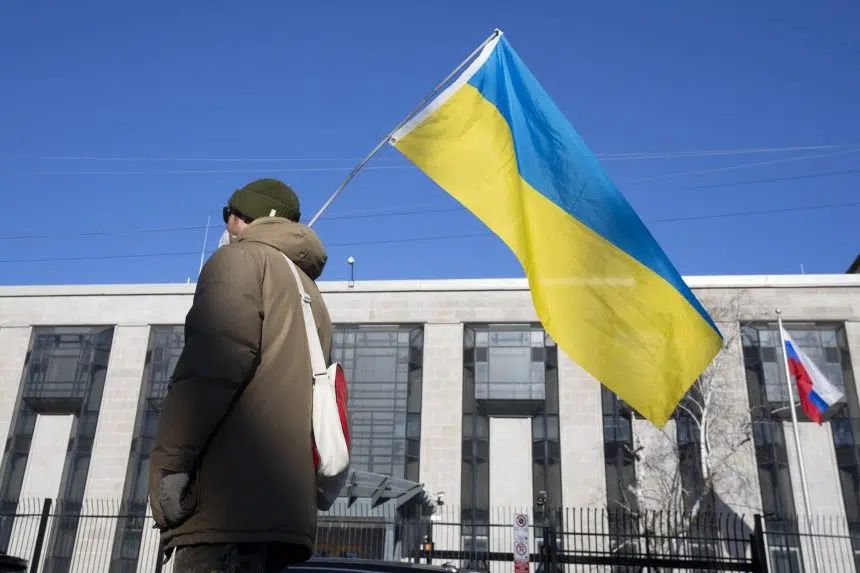Like many people, Colleen Bell has been waiting with bated breath, watching the events unfold between Ukraine and Russia an ocean away.
Bell, an associate professor in the political science department at the University of Saskatchewan, has focused her research largely on international relations and the politics of security.
She explained there are a number of issues contributing to Russian military forces moving into Ukraine on Wednesday night.
For one, Russia is facing some significant domestic challenges, Bell said, particularly economically.
“I think sometimes these kinds of military activities arguably present a bit of a diversion where the Russian population is maybe noticing (President Vladimir) Putin and his style of leadership and many of the policy decisions his government has made have really not brought prosperity to Russians,” Bell explained.
Finding an external threat, she revealed, is one way to take people’s attention away from the domestic front and force them to refocus on another issue.
Second, since before the Cold War, Russia has held a geopolitical narrative about much of eastern Europe, seeing that territory — including Ukraine — as part of a greater Russia.
Because of that, Bell said Russia has tended to react quite negatively when steps have been taken to enlarge NATO, which the country sees as “an encroachment by the west,” particularly with Ukraine aspiring to become a member of the coalition.
Part of that claim also has to do with the linguistic/ethnic narrative that Russian-speaking Ukrainians are part of Russia’s population. Bell said that has been seen with Russia’s annexing of Crimea and its backing of separatists.
Ukraine sharing a border with some states that are members of the European Union is also seen as an issue.
Further giving Russia leeway is the fact that many countries rely heavily on resources from Russia.
“The chance of them taking action that looks anything like military action is very unlikely,” Bell said.
That likely extends to the United States, which is also currently focused on disentangling itself from multiple wars it has been involved in over the past number of decades, leaving the country with little appetite for more military action.
With February being a month where countries are especially dependent on oil and gas, and a reluctance to engage in sanctions as severe as could be needed, Bell said the Russian economy will still be targeted but countries will halt before a military response.
“Because of that, they are hesitant to take significant action against Russia,” Bell explained. “None of these countries want to upset Russia to the point that it turns off the taps.”
The dynamics likely to make tension and aggressiveness more likely depend on more than one actor, too.
“Even though I think we all can condemn Russia — and we should — for its actions, I think we can also acknowledge there is a broader context here that we need to think about when we’re wondering why Russia is behaving so aggressively,” Bell said.
She said one of those issues has a lot to do with NATO and the EU and how actions they’ve taken have left Russia feeling isolated and geopolitically cornered.
That’s not to suggest that Russia hasn’t brought that upon themselves, Bell added, but it does speak to the multiple players involved.
“I think when we think about Russia’s invasion of Ukraine, we really need to think about, ‘What was the context that has led Russia to engage in this aggressive behaviour?’ ” she said.
Bell said it is hard to compare Ukraine and Russia to other countries, given that those two nations aren’t her specific area of expertise, but did note similarities between Russia and China.
It has been said that China has its sights set on Taiwan in a way that is similar to Russia’s targeting of Ukraine.
“We’ve seen China be one of the only countries that has not condemned Russia’s action against Ukraine,” Bell noted. “That, I think, is difficult to explain outside of the fact that China has its own agenda with respect to Taiwan and other parts of the South China Sea.”
The similarity comes with “a great power, a very significant sort of militarized, powerful country, next to a much smaller country that it sort of has viewed historically as part of its territory … very much in its sphere of influence,” Bell explained.
Both China and Russia have tendencies to believe they should have a say over the happenings in certain countries and their futures, Bell added, noting the “imperial postures” of both countries.
She said it is possible that China is exercising its own interests by staying quiet while the current conflict rages.
However, Bell doesn’t believe the situation with Ukraine and Russia, as it is currently unfolding, had to happen.
“I don’t think that we should ever think war is inevitable. There is always another way,” she said emphatically.
Perhaps most important moving forward, Bell noted, was “the absolute humanitarian consequences of what’s happening in Ukraine and the fact that a lot of people right now are packing their bags and fleeing.”
Bell said it’s important that the international community does whatever it can to keep borders open for people leaving Ukraine who are trying to save themselves and their families.











